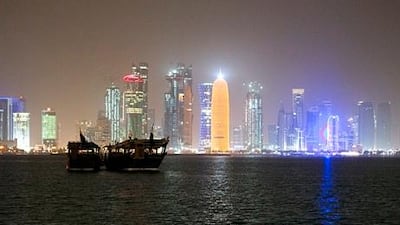Qatar raised its forecast for economic growth next year and said that while prices would rise considerably as huge infrastructure-building plans gained speed, it could contain inflation.
GDP, adjusted for inflation, was forecast to expand 4.8 per centup from the 4.5 per cent that was predicted in June, the government planning authority said yesterday.
That growth rate, down from an estimated 6.3 per cent this year, would be Qatar's lowest since 2002, according to IMF data.
A period of heavy investment in the country's oil and gas resources had ended, meaning it would move closer to the growth rates of other Arabian Gulf energy exporters, the planning authority said.
But oil and gas output next year was likely to decline less than originally thought, by 0.2 per cent instead of 1.2 per cent, largely because of more crude oil production. Infrastructure building was also forecast to accelerate, taking construction sector growth to a double-digit rate, the authority said.
Qatar plans to spend tens of billions of dollars by 2020 on railways, roads, utilities and facilities to host the 2022 Fifa World Cup, but projects have started more slowly than the business community had hoped.
The authority predicted that Qatar's budget next year would climb 9.5 per cent to 255.8 billion riyals (Dh258.06bn) as capital spending rose 10.4 per cent to 85.9bn riyals.
Although Qatar is vulnerable to falling oil prices, the authority calculated the price of crude oil would have to drop less than $50 per barrel to shift its budget surplus into a deficit.
It regarded the main economic risk as geopolitical, an apparent reference to Iran's threats to close the Strait of Hormuz in the event of conflict over its disputed nuclear programme.
"Should geopolitics develop in a way that disrupts the free flow of gas and oil, the financial resources available to the state will be affected," the authority said.
While the infrastructure building scheme will keep Qatar's economy growing, residential rents will likely rise as companies and workers pour into the country.
The authority forecast consumer price inflation to increase to 3.5 per cent next year from 2 per cent this year. In June, it predicted inflation would be 2.5 per cent. The authority said officials could use a combination of regulation and action by the central bank to avert the economy overheating.
"Inflation remains mild and is unlikely to present a threat to macroeconomic stability," it said.
"The authorities will continue to deploy their regulatory powers to prevent traders imposing unjustified increases on consumer prices. The central bank has been vigilant in managing credit growth and has a full armoury of effective tools."
An earlier explosion of bank loans to the property sector led some analysts to fear a bubble, but the authority said year-on-year growth in commercial banks' credit to private construction and property firms had dropped to 8.3 per cent in October from more than 40 percent near the end of last year.
* Reuters

